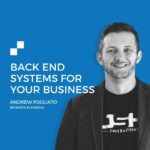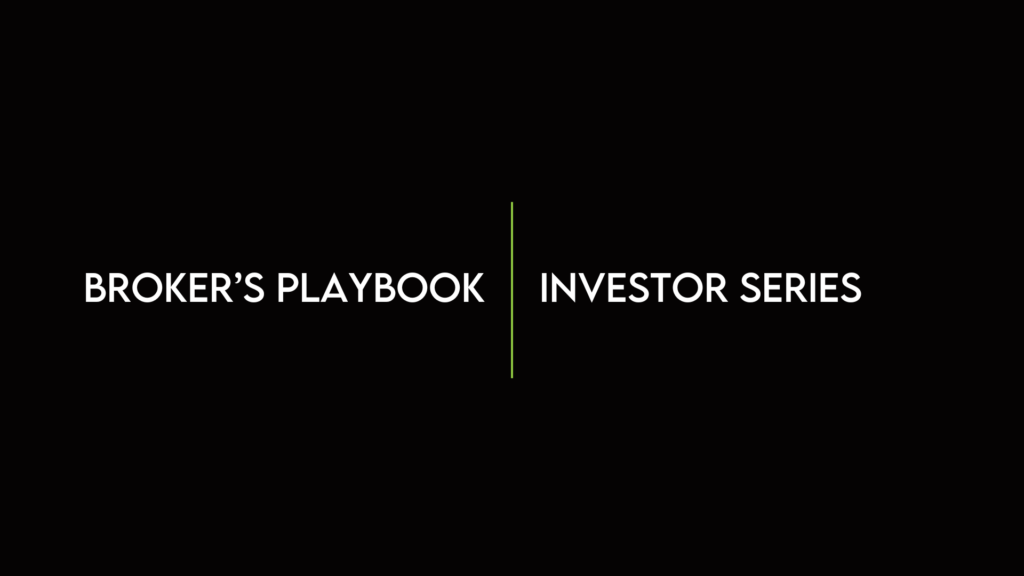
Ep: 44 – How to Maximize Your Time w/ Andrew Fogliato | Broker’s Playbook
Simeon Papailias: Good day to all my brothers and sisters in the business. This is Simeon Papailias with brokers Playbook. And today I just wanted to give you a quick sneak. To systems in the back end you can implement with Andrew fully auto of just sell homes dot com. He’s been doing marketing at the highest level in the industry for almost a decade and I’m going to be interviewing him today on what he does best what his recommendations are and hopefully get two or three nuggets that you can implement into your business today. Stay tuned. The episode is coming right up. Hello once again to my brokers Playbook Nation. It is your voice, Simeon Pappa Ellis. And I’m joined today by the very talented and extremely well known Andrew Foley auto of just sell homes dot com Andrew welcome to brokers playbook.
Andrew Fogliato: Well thanks for having me appreciate it.
Simeon Papailias: It’s my pleasure to have you and I’m really hoping to get a lot of great nuggets out of you today. You’re one of the most sought after speakers in the marketing space in Canadian real estate, so you should be very proud of that. And we had the pleasure of seeing each other at the buzz conference a couple of weeks ago. How was that for you, brother?
Andrew Fogliato: It was good. I mean, it’s nice to get back out and speak in person. I mean, in the last two plus years, that’s only that’s only the third time I’ve spoken in person.
Simeon Papailias: Yeah, we were definitely cut at the knees from live appearances and keynotes. I’m glad to have you here today. And I’m bringing you in and I’m streaming you in and I’m hoping to get this episode out to thousands of brokers to benefit from. So. So I’ll get right to it. As far as your credentials, you’ve been in this for, for about a decade.
Andrew Fogliato: Yeah.
Simeon Papailias: You’ve you’ve really brought mastery to the social media advertising and conversion via email cycles and work plans. Why don’t you tell me a little bit about where where you started and how that evolved? Where do you see the void? Was it the door knocking, cold calling that was just turning you off? Why did you choose to go down this path?
Andrew Fogliato: Yeah, so I did everything. I had one of those day one and my broker, very old school like phonebooks start at a which I actually had the best advice was actually started RD because everyone’s given up by the time they get there. So everyone else starts a day. Skip ahead to RD because they’ve all given up by then. But that didn’t work for me like I now I did doorknocking I thousands of homes I doorknocked and I actually had a deal on the second house I ever doorknocked and I was like this is going to be the easiest business. That was just about the last deal I ever got door knocking. But what I was doing was I was blogging 3 to 5 times a week. I was doing Facebook ads. And this is back when, like Facebook ads could do anything. I was probably one of the only people who got like real business from Google Plus at the time was what dates me a little bit there. But I did that work like I started like Google Plus did really well for my business. Blogging did really well for it, and I just started getting a lot online. Like, it got to the point like I would put up a blog post and I could generally consistently get 1 to 5 leads every time I put a blog post up. And it was like just a really solid way to start bringing stuff in. Like I got deals off Kijiji and Craigslist and Facebook ads and I realized like, that’s where I could get stuff. So I started I shifted away from cold calling, doorknocking and trying those things to my prospecting. Time became online marketing, and I came in not knowing like I came from the construction industry. I was a concrete farming estimate here, so I was just sitting there with blueprints all day by hand doing those.
Simeon Papailias: I will not speak of concrete in your in your Italian background having anything in common, but I know more Italians and more concrete than ever. Anyways, I love that story. Tell me, how did that transition and elevate to where you got a reputation that you’re an online lead magnet?
Andrew Fogliato: So it started slowly. Was actually originally my I had a very old school office, like I mentioned, and I was doing an open house one time on my iPad, like people sign in an iPad. I remember my broker came in, he goes, Oh, that’s actually really smart. Like, I can’t read people’s writing half the time when they sign in on my sheet, Could I set up a training in the office where you could teach everybody how to do this? I was like, Sure, happy to. People give back to me all the time in the office if I can give back anything. A couple of months into the industry, I’m down and I remember that session. It was basically just download this app, put in your name and you’re done like buddy book 2 hours. I was done in 15 minutes. And so we just started talking about some of the other stuff I was doing in terms of like social and online because people started taking notice in the office like, Oh, who’s this young guy actually doing stuff on social? And over time that led to like another session. I ended up doing one on Evernote. Like I think in the early days I was actually before is known as the Facebook ads guy is known as the Evernote guy.
Simeon Papailias: Funny enough, the year that you’re talking about those early tens, Evernote was the shit.
Andrew Fogliato: Yeah. And I was the guy taking over. Like I had my entire business run out of there. Like, I remember the transition happened, so I ended up getting an offer from one of the big brands to train agents and it was just as legalised digital signatures came in, so there’s this huge push to go paperless. So my initial training career was actually more, less on marketing and more on how to go paperless. I was a DocuSign certified trainer. I visit like the Evernote guy in Canada doing that, but you can’t build a business teaching people ever know. So what eventually happened is I started doing more marketing stuff and as I started doing more marketing training for people because really like how to use social, how to do. Blogging, which was my specialty at the time. A lot of people just started saying, like, Can we just hire you to do that for us? And I remember my old mentor. So back when I sold, I had this to these two mentors, Marcel and Barb. They sold in Aurora, great agents. And as I was chatting with them, they’re like, Can you evaluate some website providers? We don’t know what we’re looking for. So I basically went I did the research. I looked at every website provider out there with pricing features, all that, and I presented them. I was like, Here’s your options, here’s my recommendation. And he’s just looking like deer in the headlights. He’s just like, I swear, I don’t know. My lips are here.
Simeon Papailias: You can swear, brother.
Andrew Fogliato: He’s like, He’s looking at me like, Fuck, Can you just deal with this shit for me? I don’t even want to do it. Like, just. Just do it for me. I just want to sell homes. And, like, as soon as they said, just sell homes, I was like. Huh? Domain was available, but.
Simeon Papailias: Remain.
Andrew Fogliato: On the spot. And then a couple of months later, I just started being like. Like he was my first call when I finally was like, okay, this is a business I’m going to do. So I was like, Hey, do you know how you mentioned you want to hire me for it? A thousand bucks a month. I’ll run your online presence. He’s like, Great, let’s sign up. And like, by the way, I’m going to need six months up front. And he’s like, All right, let me know where to send the check. So I’d like check next day. Second call, same thing. So like the first week of doing it, like I brought in like 10,000 bucks, replace my salary from training within just under three months. Basically, I haven’t looked back. I mean, there’s been a lot of ups and downs.
Simeon Papailias: Of.
Andrew Fogliato: Course, in there, but.
Simeon Papailias: Well, I love the story because it’s it’s genuine and it’s it’s grassroots and it’s kind of from the ground up, as everything should be. And I love to hear that story where it was self discovery and you kind of went with what you liked and what you found joy in and evolved naturally. When when agents call you today, what is what are most agents looking for? What is your number one service request? What are people looking for?
Andrew Fogliato: I mean, because of the brand we’ve built where we’re known for Facebook ads, that’s what most people come for, like from a like this is what they’re really coming for is confidence to know that what they’re doing online is working the end of the day. Like that’s almost what we’re selling, just as much as the confidence that they’re going in the right direction with their work. But yes, people come mainly for Facebook ads. That has since evolved. Like I’d say in the last year, the biggest shift for us has been less than just straight running Facebook ads because, you know, you’ve worked with a lot of agents. If I give 1000 leads to one agent, so 1000 leads to another, you might get one guy who builds a great business, the other goes broke. Yeah, right. Like it’s a wide range.
Simeon Papailias: So execution and follow up is everything. And we’re going to be talking about that today.
Andrew Fogliato: Yeah. So we we have a lot now on the email marketing side that we do for clients. And then also just general like how does this all fit together? Like essentially like helping them put together the puzzle pieces of a successful marketing business because like the amount of time I spent, like I’ve spent time with you, your partner, like how much I’ve spent so much time with our producers for our clients, there’s people in the industry that are pretty good idea of how the entire marketing stuff fits together. And so now we’re helping people put all that together. And then after we set that up, then we might just do their Facebook ads. But still today, the biggest driver for incoming stuff is people asking for ads or for help with their Facebook ads.
Simeon Papailias: So so a Facebook ad is a starting point of a lead, obviously. Sorry, I’m just reaching for my glasses. A lead comes in. What does an agent typically do? Do you give them training on the life cycle of a lead? Best best practice on follow up. How many touch points, etc.. What is? So the people that you work with versus somebody doing it on their own, are they going to close more deals as a result of your work? Or from your advice, is it done for you? How does that work? What are you experiencing?
Andrew Fogliato: So it’s a hybrid. So some say you just hire us for Facebook ads. We’re going to generate the leads, put them in the CRM, then it’s your system. We’ll give you training like you’ve probably heard of Phil Jones, the sales trainer.
Simeon Papailias: We have, indeed.
Andrew Fogliato: Yeah. So, like, I brought him in. We did this past November, a lead conversion month. We brought him in to train our clients how to respond better with leads, how to have better conversations with leads and how to do that. So we offer training and resources. We make those available to our clients. Some clients, though, no matter what you do, they’re not going to pick up the phone, they’re not going to put in that side of it. So there are there’s another segment of our clients where we actually do all their follow up marketing. We don’t call our business. We don’t have ISAs, we don’t call leads for anyone, but we’ll do the email marketing. So we’ll set up the initial drip campaign. Sometimes that includes initial drip text messages and then the long term follow up, because I think a big mistake that we see is like a lot of agents are focused on the people ready to go. Now they get a new lead in and they’re like, All right, my ten days of pain or my two weeks of pain or whatever, the different way that someone puts in speed to lead. Everyone’s got to go, speed to lead. And I always use the analogy and you might have heard this story before of I think it was the Houston airport, and they kept getting complaints that people were waiting too long for their their bags at the carousel. There was a big source. So they kept doing like, how can we get bags to the carousel faster? How can we get bags faster, faster, faster, faster.
Andrew Fogliato: They cut the time in half to get bags to the carousel. Complaints didn’t change. So then they figured out the ingenious way of getting rid of complaints. They made the walk from the plane to the carousel longer. So that was it. But because people were taking action, it made it feel like they were doing something. They didn’t complain anymore. So what we also started looking at doing is what if we took that same concept to Legion, right? What if we said instead of focusing on getting to a lead in 10 seconds, what if we gave the lead something to do? Right. So like someone ups in let’s say online a listing most people the response on that page when they become elitist. Thanks. We’ll be in touch. Well, what if instead of be like, great, do you need to sell your current home to buy to buy this one? You just ask this about if you want, click below and we’ll let you know what your home would sell for if you put it up on the market today so you can get more clarity on the price that you can afford. And then they opt in to that. You can be like, Oh great, we’ll let you know shortly what your home would be worth here if you want, you can also download our guide on how to prepare your home for sale so that you can get more money when it goes on the market.
Simeon Papailias: So you’re giving steps, distractions and otherwise things that are engaging to the lead further, qualifying them while the agent is getting ready and or hopefully at this point has made contact. Yeah.
Andrew Fogliato: And providing them value along the way. Like I like to use dating analogies a lot with online leads. It’s like how many people essentially their online lead strategy is like going up to some of the Barbie and like, Hi, I’m Andrew, what’s your name? I’m saying the name of. You’re like, Great, I’ll be back later to chat. Like, maybe now you offer to sit down. You offer to buy them a drink. Like you can’t go straight to taking them home.
Simeon Papailias: There’s a little warm up here. Did you need to leave your current partner before we can go on a date? Exactly.
Andrew Fogliato: There’s a lot of stuff there that people seem to skip. And then even in there, right, Like your initial follow up is to identify those ready to go now. But that’s maybe 15% of leads are moving the next 3 to 6 months, 85% are further out.
Simeon Papailias: What are what kind of conversion rates are we seeing right now? Is Facebook on a decline, like a lot of people say, is Instagram on the rise? Is Ticktalk the new thing? Where does someone who lives in that world of marketing on socials, how do you see the playing field? Where where should people be turning their attention or spending their money?
Andrew Fogliato: I mean, the classic marketing answer of it depends. So it depends on who you’re going after from like, let’s say, tick tock, for example, to start. There’s tremendous value in there. Organically speaking, it’s like early Facebook days from the potential it has for a business. I think similar to Twitter and YouTube, it has a higher degree of difficulty than Facebook and Instagram. You have to be really on top of everything. You have to be like up with the trends, putting out video regularly and that like for a lot of agents, that’s overwhelming to do. I think you can get more today out of Facebook and Instagram for most people. I don’t think Facebook organically outside of Facebook groups and personal connections is basically dead except for paid ads. The only value of a Facebook page now is running paid advertising, which still, if we grab a listing 1 to $3 a lead consistently like leads are cheap on there. They work really well.
Simeon Papailias: And they’re typically real. How does the conversion of those leads?
Andrew Fogliato: It depends on the campaign, right? So let’s take your classic lead gen tactic and real estate, which is like hide the price. People opt in to get the price. You’re going to have your typical 1% type of conversion idea, pretty standard in the industry, 1 to 2%. There’s levers you can pull like different types of forms pre qualifying a little bit that might get that to two and one half three with the right systems like an expert agent at conversion might get to five or 6%. But we also look for opportunities of how can we flip the script a little bit on it. So let’s take force registration. The traditional way to do force registration is to see this information that’s already available. You have to give me your name, email and phone number. Well, what if you changed that and said this information isn’t available yet to anyone? Register for updates so that you get it when it is. So you started the coming soon and say like our stages are in there right now. Photographers are coming tomorrow. We’re doing the research on what price we’re coming to market with, register for updates and we’ll send you everything as we get it so that you can get it ahead of everyone else. And then when it goes live, we like we’ll send you updates on any price changes. We’ll send you the update when it sells and what it sold for. So now instead of gatekeeping information, you’re giving them an opportunity to be ahead of everyone else.
Simeon Papailias: Because gatekeeping really is not effective. I have seen it and I’ve experienced it. I don’t like it when somebody gate keeps me. I will nine out of ten times close the window. And in more than likely a company with a little bit of a swear.
Andrew Fogliato: Word and their services, if you know, like there’s a it’s called ten minute email where you can actually just grab basically it’s a fake email address that exists for 10 minutes. Sign up with it. It’ll send you whatever’s gotten from it, and that email’s then gone forever. Well, there’s a lot of ways around doing those types of things that like, if I want to get something, I can get it without your gatekeeping anyways, right? Or there’s the traditional like f I’d go f yourself dot com emails that come through. And there’s certainly tactics you can do to get people’s real contact info. But at the end of the day you’re just annoying them. And then Google does not like force registration either. But with that being said, there are people who run very successful businesses doing that.
Simeon Papailias: And yeah.
Andrew Fogliato: People who run very simple business, cold calling. There’s a million ways to do it.
Simeon Papailias: Yeah, no doubt about it. What is your top advice to a new agent coming into the business without a significant network? It’s so this is the number one question that I get. I mean, I run a team of 50 agents, one of the biggest in the country. We we sell a lot of real estate. We do a lot of training. We’re busy. My new agents coming into the system always have the same question. I know 100 people, 50 people, 200 people. I used to be a schoolteacher. I used to work in retail completely not related to real estate, but I love real estate. I want to do this. Where do I start? And growing a network, would you say? Social media advertising and converting them into an email work plan because like, that’s where those are. My few next questions for you. Do you think that is a way to start and build a business?
Andrew Fogliato: I think before you get into that, you have to niche down, especially when you’re starting out right. Like you need something that gets you a foothold because like, let’s be honest, if I started today competing against you and I’m brand new agent, which means I probably don’t have much budget, the odds of me coming into your market and being like, I’m about to take over from Simeon here, that’s not probably going to happen.
Simeon Papailias: It’s probably not going to happen.
Andrew Fogliato: What I do need to do is get a head. I need what is that one piece that maybe you’re overlooking because it’s not that big of a business. But for me as a new agent, if I can do five, ten, 15 deals and get my foot in the door, that can lead to more and then go to the next one and the next first. Like when I started, I looked at young couples looking to buy their first home. That was my thing. I went hard, like I remember like I knew it was working because I went into a listing presentation and they told another agent I was competing with that I was being interviewed. He goes, Oh, no, no, you shouldn’t hire Andrew to list your home. He only works with people buying their first home. And that was I was like, That means I’m winning. But that’s like, thing is I went hard, very, very niche down.
Simeon Papailias: In creating that brand for yourself. Right?
Andrew Fogliato: Exactly. And then I grow with them and I like look at Wayfair as the example. Do you know the story of how Wayfair got started? Like they were small websites like Grandfather clocks dot com and like a bunch of little ones like that. Like eventually they had like a thousand super niche websites and then once they dominated all those, they just combined them into Wayfair and became just the big brand across everything. Right. If I was on your. If I was with your team, I would look at. Okay, can we brand each of these agents under us to these small niches and then they can graduate and can elevate the whole brand at the end of the day, too. But like, niching down first is really important. And then where is your where is that group of people exist? If you’re going after younger people generally, like Instagram, TikTok, that’s where they’re going to be. I think Instagram is really important, especially Instagram stories. You’re looking for ways to get conversions and new business. Instagram stories is by far the number one right now from organic social that we’re seeing because it allows private conversations with people. And that’s a key one is like people don’t like being public in their back and forth. But if you can get that into a DM, people are way more open, they’re more willing to engage.
Simeon Papailias: And that’s where stories live. Stories lives in.
Andrew Fogliato: Dms. Exactly.
Simeon Papailias: So, so.
Andrew Fogliato: It’s not hard. And then using what I love is like Instagram stories like the question box or it’s like, submit a question here. Well, you can use that to get their email to write you a list and be like, Drop your email and I’ll send you the data sheet for this listing. And now you’re capturing the emails and you can kick off an email program to them because like at the end of the day, as much as I like, build my business on Facebook, Instagram, I know tomorrow they could kick me off and I could never get it back. But if I still have my email list, yes, it’s going to suck to lose that, but I can still run my business and something that I own. And so a lot of what we do is to can we drive to build our email database up so that regardless of what platform is the one that’s winning now or which one I’m not allowed on anymore, I can still go and do really well. Like everything’s focused on growing that email database that we have so that we can work that database.
Simeon Papailias: Andrew Tell me about your work plans. You’re done for you marketing. If I wanted to retain your service, am I looking at a newsletter campaign? Am I looking at a scripted campaign? What is it that you provide that that agents find value in?
Andrew Fogliato: Sure. So I mean, it is customized to each client. We don’t do just like a canned thing that goes out. Traditionally. We do model most of our email newsletters that are weekly. For one. I think not doing it weekly is a mistake for most people. And the way that we frame it, I don’t know if you’re familiar with the Morning Brew, so are there any email newsletter for business? They just sold the Business Insider last year for 75 million just email newsletters and huge business. And we actually kind of modeled their way of doing newsletters for real estate. It’s kind of like it was a little bit of an inspiration for us and what we’ve noticed that’s gone really, really well. But basically the idea is 90 to 95% of this email is about providing value and not about us ever, right? So like the first section, it’s like what’s going on in the community? So it’s like a news then. So I’ll use the example. So we follow the same format for our newsletter out to agents. The first section is what’s going on in the Canadian real estate market. The next section is Agent marketing that we like. So we’ve gone and found an agent’s piece of marketing that we like and we’ll highlight that each week. That’s one of our biggest click thrus on anything is highlighting other agents marketing. When they’re doing it for an agent to their community. We might find a nice local business. We like business highlight of the week and then again depends on their niche. If it makes sense to include that, then we’ll just basically have a couple of other sections.
Andrew Fogliato: But what really has set us apart and done really well is that we started adding in things that to most people don’t make sense. So when we put in as trivia, so we randomly at the beginning, somewhere beginning to middle of the email, we put in a trivia that’s like I remember one that did really well for us randomly was Why do Scottish people paint their door red? And to get the answer, there’s no secret. It’s just you. Scroll to the bottom of the email, the answers there. But it gets people to scroll all the way down to the bottom of the email and then people will tag us on social, putting that same trivia out there because they found it interesting and they’ll be like, I learned this and they just sell homes newsletter and we get tagged. And the other thing I started adding is it started as Puppy of the Week where I just put in a photo of a cute puppy at the bottom of every email and it just called the section, which is called. Sometimes we all just need to smile. And that has now morphed into like feel good stories. So like, you know, stories that are in the news that make people smile and make them happy. So it’s not always Puppy of the Week, but a ton of great feedback on that. And that’s funny because it keeps people going to the bottom of our emails and reading the whole thing and it’s the feedback on those. Like we’ll have people sometimes repost the puppy of the week on their own social and like thank us for it, which.
Simeon Papailias: Drives more subscribers, which I and I love it. So this is your own companies that just sell homes newsletter where your audience is US brokers. And we’re finding entertainment and value in your newsletter via different vehicles. Are these the same type of emails or is the same strategy effective to our clients?
Andrew Fogliato: So we and we do this for clients. We basically take our exact newsletter, but then we change the focus. So instead of targeting agents, it targets your niche and that could be your community. It’s like some of our clients are more investor focused, so you don’t necessarily go towards like, here’s what’s going on in poor credit. It’s more kind of broader and like what’s maybe an investment trend that we’re seeing, whereas like the cap rates, stuff like that. But basically it’s we look at your niche and we do like what’s interesting to them that they’re going to want to read and then we just fill that in and then obviously, like if we have clients that create content, that certainly makes their life a little bit easier because we can then highlight some of the content they’re creating. But then again, we look at each client what makes sense for them, but it’s that same idea of quick bits and they can click to learn more.
Simeon Papailias: What is the typical ad set look like? Is it do people use it more for listings to generate buyers with new development? What kind of campaigns do you find yourself working on and do you see different different campaigns and different cities and or provinces?
Andrew Fogliato: So typically, I mean different classes like we do a lot of pre con we work directly with some developers to pre con consistently is basically the same thing. At the end of the day it’s like if you want to sell a horse, easiest way to put up a sign that says horse for sale. When we find a developer we don’t have to get fancy. It’s just here’s what’s available. Like we actually just got numbers back from a developer we worked with who sells industrial condos and they they’ve sold 29 units and like at this point they expected to sell like five. And of the 29, ours were 21 of them from the Facebook ads. And it’s not that these were fancy ads, it was just here’s industrial condos, here’s the features of this one that might be of interest to you. Click here to get the pricing cheap.
Simeon Papailias: So are you better? Is your system in what you excel? Do you know the beat the algorithm? Because these are things like these are words that I actually personally don’t understand that well, I’m not a skilled marketer. I create a truckload of content. I work with a lot of different professionals, but you as Andrew Foley auto of just sell homes. So the reason that platform has if I were to do the same thing, put condos for sale and I slopped and I went to the back end of Facebook and I put 100 bucks a day or whatever the case may be, the difference of me doing it versus you doing it. Is there a difference? Is there a specific skill, experience and in way you do things, why does somebody pay someone above and beyond being too busy?
Andrew Fogliato: So there’s two main reasons. Like yes, the too busy like a lot of our clients, I would rather you know, how to do what we’re doing. You just don’t have the time to do it because it’s not the highest, best use of your time. That’s a lot of what we work with now from the expertise side. Short term, you could probably get similar results if you put up a same ad where our expertise especially comes in is, all right, that ad runs for two weeks. The cost per lead starts going up. What do you do next? What are you looking at? How do you adjust it? What type of things do you do? What’s been new that’s been working? So like I’m in a mastermind group with like none of them are in the real estate industry. Generally speaking, in that group, there’s people who are spending 100,000 a day. There’s one guy who ran a campaign that was a million a day for a week. What I can learn from them about trends is not something you can learn. Running real estate ads like the top spending Facebook ad people for real estate might be 10 to 12000 a month. You get the odd one who says they might spend more than that. But majority of agents, even on a high spending Facebook ad accounts are under five K. And we have people who are spending that in 20 minutes that we mastermind with. So we’re always learning what’s working best, what’s doing that, and then applying those lessons to real estate in terms of like the actual optimizations. The beauty of Facebook, especially with housing category rules, is we don’t do a lot on the targeting side anymore. We we do a lot on retargeting, but on the actual initial ad, we keep that very, very broad and then we use the copy to actually narrow down to our target audience because the way the housing category changed it is like you can’t use almost any targeting. Now there are ways around that.
Simeon Papailias: And why is that? Those are just permissions with the iPhone and all those things that I’ve heard.
Andrew Fogliato: No. So housing categories because and this actually started in the US, it’s been in the US for a long time as what happened, it started in Oakland. The landlord got caught excluding black people from seeing ads to rent a rent a condo in this building.
Simeon Papailias: Are you kidding.
Andrew Fogliato: Me? Yeah, it’s completely it’s crazy.
Simeon Papailias: And then Facebook, real life.
Andrew Fogliato: Yeah, that really happened. And then Facebook brought in this rule that you had to certify you were complying with local housing regulations. But then as soon as you certified you were going to comply, you could go right back to discriminating. And then again, it happened in Minneapolis. Another landlord was found excluding black people from seeing ads for rentals. And so Facebook got find $1,000,000,000 and was told if this keeps happening, that’s going to look like a small fine compared to what’s going to happen. And so Facebook brought in housing category restrictions that don’t allow you to discriminate. Back then, there was actually a targeting called ethnic affinity African American. Like you could just I’m going to include or exclude black people. That could be your targeting. And there is like valid reasons if that’s like your target demographic, to go after them. Right. But like from a housing, anything that’s a protected category that’s bad. And the reason they got rid of a lot of the other interests is if you know how to target and leverage targeting, I can just as easily include or exclude certain ethnicities. Like as an example, we had an Indian client who wanted to target Indians. He wanted to target people because he wanted to speak in his language in the ads and he wanted them to understand. So we just went and targeted Bollywood stars. So anyone who likes Bollywood stars, odds are are Indian. There’s not a lot of people that follow Bollywood stars that are in Indian.
Simeon Papailias: That’s a great concept. Yeah.
Andrew Fogliato: So as we look at who from a community would follow something that no one else would like, I use the example in real estate a lot, like if I chose Tom Ferry. I know anyone following Tom Ferry on Facebook is going to be someone in the real estate industry. But if Tom Ferry is at a conference speaking, people are excited. He walks it on the street and no one’s going to know who he is. That’s right. Unless it’s someone else. That’s what we call famous of the family. So if you know who’s famous to that group, but to no one else, you can target that group really easily. So they do remove all those those options as well. So there’s only one way around it, and that’s basically you run a non real estate ad that has a video and then anyone who watches that video will see your real estate ads. But because the only people watching that video are so hyper targeted that when you run the broader ad, it’s only running to those people that you picked earlier.
Simeon Papailias: So I repeat, this is why you are getting paid to do this. Because I have a zero tolerance for any nonsense, and I also have zero time to figure it out.
Andrew Fogliato: Yeah. Well, the quick way around it for you being in Toronto is you have the advantage of a lake next to you. So when you have to do a 15 mile radius, you can toss the middle of the radius in the water so you don’t have to go all the way up to Vaughan or Richmond Hill with your ads. You can actually target just the core and then just a lot of Lake Ontario.
Simeon Papailias: Isn’t that genius?
Andrew Fogliato: So it’s great for like we have clients in Florida and West Palm and Fort Lauderdale, they could actually run out to the waterfront because 15 miles gets wasted in the ocean pretty quickly.
Simeon Papailias: And I love that. Andrew, I do want to wrap up. What are your top three tips in getting started with ad sets? So let me just say this question number one, what is the best way to do it on your own? If you’re going to start an ad campaign, where do you start? What is a typical budget and how do you gauge success for do it yourself?
Andrew Fogliato: So if you under yourself and you need to get some leads in, use a Facebook lead generation ad, which is a form that pops up when you click on the ad pre filled in with their account info. So you get their name, email and phone number really quick. What you want to do is advertise either a listing, this doesn’t have to be yours. You can borrow them from someone in your office or a type of home. But what the trick here is, and this is actually what we’ve said in the last 12 to 18 months, is the best way to target sellers is to target the house they’re going to. So like I’m here up a new market, which is the suburbs of Toronto, the most desirable type of home appear is a four bedroom detached home. And I know anyone getting a four bedroom detached home in new market has to sell their current home to buy it 90% of the time. That’s right. So if you do get a list of four bedroom detached homes with a big yard, a new market, I know all those leads coming in, probably going to have to sell as well. It’s a really easy ad to.
Simeon Papailias: Sell, more than likely living in Richmond Hill, North York or Scarborough.
Andrew Fogliato: Exactly. So it’s just a very simple do you want this get a list that you can be the first and you make it very specific and then change. Like just think like what are people asking for? Like early pandemic ads that were just like, get a list of homes with pools blew up, like we are getting sub $1 leads in a lot of areas. And then the key is to match the language to your area. So like we had a client in Durham where there was like everyone wanted a rural home and we had a client in Sudbury. They wanted the same thing. But up there they call it a home with acreage. Right. So like, you know, like northern Ontario, they don’t call them cottages, they call them camps. It’s like you have to match the language to what people say.
Simeon Papailias: Or maybe do a little bit of research and know your audience is basically all we’re getting at.
Andrew Fogliato: But you always want to talk like they don’t call them listings in your ads, call them homes for sale. The public doesn’t call them listings, new listings.
Simeon Papailias: You’re absolutely right. How about New Home for sale? That’s great. So so number one was how to do it on your own. Thank you for the answer. I love that. That’s a great value. Number two, what would you say is your best value proposition to the market? So if I was going to call you to hire you for one thing, what would it be?
Andrew Fogliato: Setting your strategy so that you know, you’re doing the marketing in a way that it works because a lot of people will like, I’m sure you’ve seen this, people will look at what you guys are doing as a team because you’re one of the most successful basically in North America. And they’ll be like, All right, I’m just going to copy what I see them doing, except they don’t see the pieces behind the scenes that are actually making it work. They might see this ad and be like, Great, I’m going to do that. They don’t see the 20 emails, ten text messages in 50 calls they’re getting in the retargeting ads that pair with that that actually drive results. Well, we will help you put all the cogs together that makes a marketing strategy work instead of just trying to copy. Like I got called in by a big team one time and he’s like, Andrew, whatever you do, you have to be exclusive for us in my marketplace because anything I do online, people copy right away. The next thing he says was, But nothing we’ve ever done has worked before. Everyone was copy. He was doing 500 deals a year and everyone was copying him, but he had never done anything that worked. So we’ll help you figure out what will actually work for you, because like what? Let’s look at you like you guys put out a ton of content. You have time to do that. We will get some teams to come to us. Like I can give you 15 minutes a week that I can put towards my marketing. The plan I create for them is going to be very different than someone says I like. We have one client right now. He’s like, I can give you 4 hours a day of content creation. The plan I do for him is very different. The person is going to give me 15 minutes.
Simeon Papailias: I got you.
Andrew Fogliato: So custom plan suited to your business and we’ll help you actually implement it and then train your team to take it in-house by the end of a three month stretch.
Simeon Papailias: Andrew Where do people find you? How can people get in touch with your team? How do we go about this?
Andrew Fogliato: So just the Homestar comes our website. You can learn about us there. If you want to talk to me directly, either email me at Andrew. Just sell homes or I bought the domain book Andrew Dossier that forwards to my calendar and you can just book a call any time that’s open. There’s literally just an option that says sales call. If you want us to take a look at your Facebook ads, we do offer a free 15 minute Facebook ad review. You can pull up your account and I’ll go through your Facebook ads with you and tell you what you can do better.
Simeon Papailias: Well, I hope that one day soon and I mean over the next few days, I would love for you to do a quick audit for mine and my system. I really wouldn’t mind that at all. I’ve never had an audit done from the outside, so I would love to hear your take on it and areas that we can improve on. So I would appreciate it. Andrew, thank you for joining me today. I found great value in your insight is potentially invaluable and hopefully I find out that I haven’t been wasting all my money and doing it the wrong way.
Andrew Fogliato: You haven’t been. There might be optimizations.
Simeon Papailias: That’s right. Thank you for joining me, my man. I appreciate you.
Andrew Fogliato: Thanks for having me. I appreciate it.
Simeon Papailias: To our entire audience, thank you for tuning in. Thank you for hanging with us. I do hope from the bottom of my heart that you found lots of value in Andrew Foley auto today. And if you did enjoy it, please take a moment to subscribe to the show. Tell your friends about the show. Share the show and of course, get it back to us with your feedback. And if you are a broker that has a message to share, please reach out to me directly so I can get you on the show and get everybody what you have to say. Thank you for joining me. We’ll see you soon.








